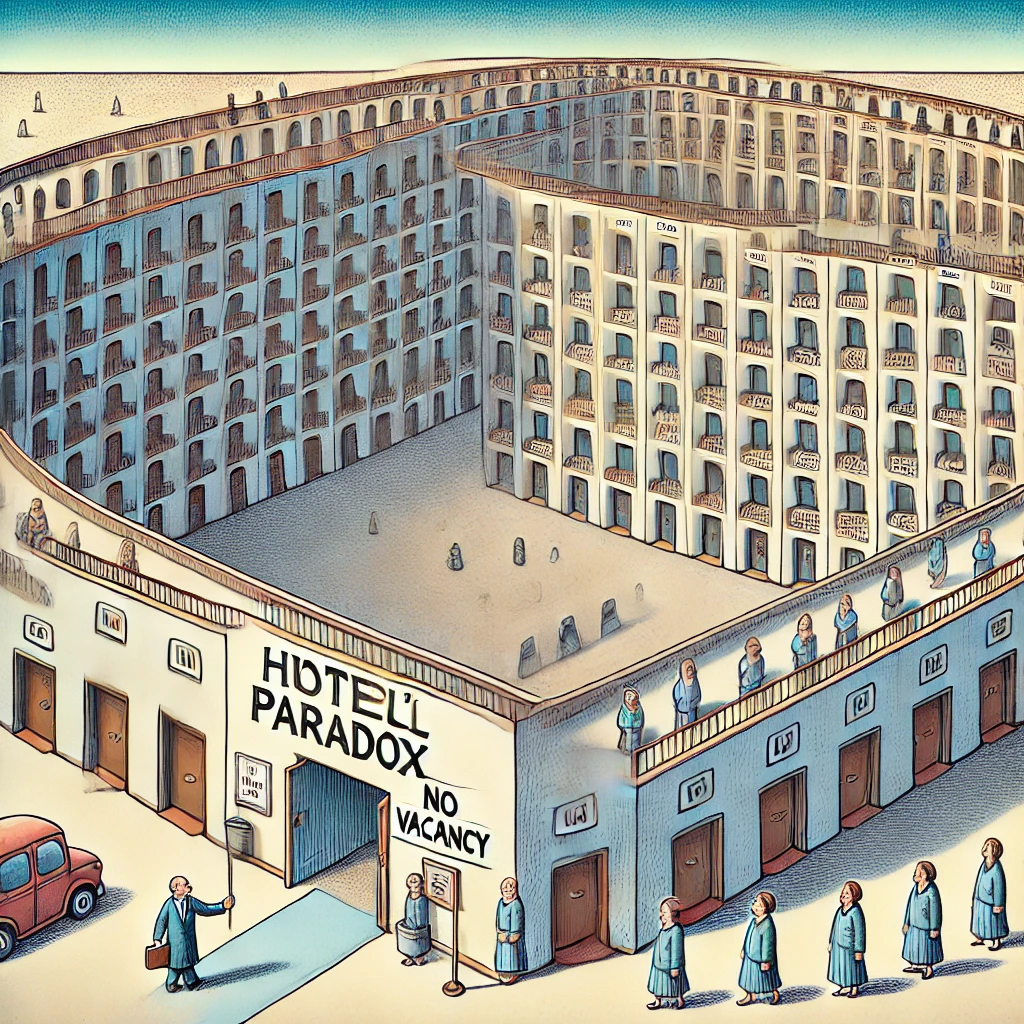
Impossible paradoxes: The Hilbert Hotel paradox
Mike MunayShare
Imagine you arrive at a hotel after a long journey, tired but excited to rest in one of its rooms. The problem is that the hotel is completely full: every room has a guest. Normally, you would look for another hotel, but this is the Hilbert Hotel and there's no reason to worry, even if all rooms are occupied.
This paradox challenges all the rules of everyday logic. In this special hotel, there is always space for more guests, no matter how many are already staying.
The infinite has no limits, and paradoxes challenge your perception of space and time.
What does the paradox say?
The Hilbert Hotel paradox is a mental experiment designed by the German mathematician David Hilbert to illustrate the counterintuitive properties of infinite sets.
The Hilbert Hotel is a hotel with an infinite number of rooms, all numbered sequentially: room 1, room 2, room 3, and so forth. Each room is occupied by a guest, which means that, in principle, there are no vacant rooms.
However, if a new guest arrives, the receptionist has a clever solution: move the guest from room 1 to room 2, from room 2 to room 3, and so on, thus freeing up room 1 for the new guest. This can be repeated indefinitely, allowing the hotel, despite being completely full, to always have space for new visitors.
The paradox becomes even more astonishing when a bus with an infinite number of new guests arrives. Instead of panicking, the receptionist simply moves the guest from room n to room 2n, leaving the odd-numbered rooms empty and allowing all the new guests to be accommodated in them. This concept challenges our intuition about what it means to be “full” and offers us a new perspective on the infinite.
What does it intend to demonstrate on a physical or mathematical level?
Mathematically, the Hilbert Hotel paradox illustrates the nature of infinite sets and how the infinite behaves differently from finite sets. The hotel has an infinite number of rooms, and what Hilbert demonstrates is that, despite being “full,” it is still possible to add more guests. This concept is a classic example of managing the cardinal numbers of infinite sets.
In mathematics, the size of a set is called its cardinality, and the Hilbert Hotel paradox focuses on the cardinality of countable infinity, also known as the set of natural numbers \((\mathbb{N})\). Hilbert showed that an infinite set like \((\mathbb{N})\) has the strange property that, even if we add additional elements, its cardinality remains the same. In this case, the number of rooms (natural numbers) and the number of guests remains infinite, which is expressed as \((\infty + 1 = \infty)\).
This paradox demonstrates a crucial feature of the infinite: you can add, rearrange, or duplicate elements in an infinite set, and still have a set with the same cardinality. This contrasts radically with our everyday understanding of finite numbers, where adding a new element always increases the size of the set.
What are its technical foundations?
The technical foundations of the Hilbert Hotel paradox are based on the work of mathematician Georg Cantor, who developed set theory and the cardinality of the infinite. In set theory, there are different sizes of infinity, and the Hilbert Hotel focuses on countable infinity, which corresponds to the cardinality of the natural numbers \((\mathbb{N})\).
The fact that you can move guests from a room numbered n to n+1, or from n to 2n, illustrates that the set of natural numbers remains countably infinite, no matter how many new guests you add. Mathematically, this is expressed as:
- \(\mathbb{N} + 1 = \mathbb{N}\) (adding one element to an infinite set does not change its cardinality).
- \(\mathbb{N} + \mathbb{N} = \mathbb{N}\) (even adding an infinite set of guests still maintains the same cardinality).
Moreover, this paradox touches on the concept of bijections (one-to-one correspondences) between infinite sets, showing that equivalences can be established between an infinite set of rooms and an infinite set of guests, allowing them to be "rearranged" without changing the total size.
Conclusions
The Hilbert Hotel paradox is a fascinating lesson on how logic and mathematics challenge our intuitive notions of space, quantity, and finiteness. The countable infinite, in particular, has properties that do not apply to finite numbers, such as the ability to continue expanding endlessly without changing in size. This mental experiment by Hilbert teaches us that the infinite is not just an abstract concept, but has concrete implications in how we think about the mathematical universe.
Curiosities about the paradox
- The Hilbert Hotel is a favorite among philosophers and mathematicians because it provides an accessible way to explain abstract concepts about the infinite to people without advanced mathematical training.
- This mental experiment is not limited to natural numbers \((\mathbb{N})\); it has also been extended to discuss larger infinite sets, such as the real numbers \((\mathbb{R})\), which have a different cardinality called uncountable infinity. This poses even more complex paradoxes.
- David Hilbert, the creator of this paradox, is one of the most influential mathematicians of the 20th century. In addition to his work on the infinite, he made significant contributions to geometry, number theory, and theoretical physics.
- In popular culture, this paradox has been referenced in series like Futurama, where the concept of the Hilbert Hotel was used as part of plots about infinite universes and alternative realities.
Relationship of the paradox with the real world
While the Hilbert Hotel is a mental experiment and does not have a physical world equivalent, the ideas it illustrates have applications in areas such as computational theory and information theory. For example, problems involving countable infinities are fundamental in the development of algorithms and understanding the limits of computing. The fact that we can “rearrange” infinities helps us think about how to handle large amounts of information.
Moreover, in cosmology and theoretical physics, concepts of infinity are applied in discussions about the nature of the universe. Some theories suggest that our universe might be infinite in extent or contain infinite possible variations of events. The Hilbert Hotel paradox serves as a philosophical tool to explore these concepts and understand how infinity might operate in nature, beyond our human intuitions.
